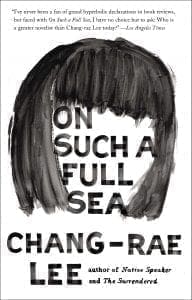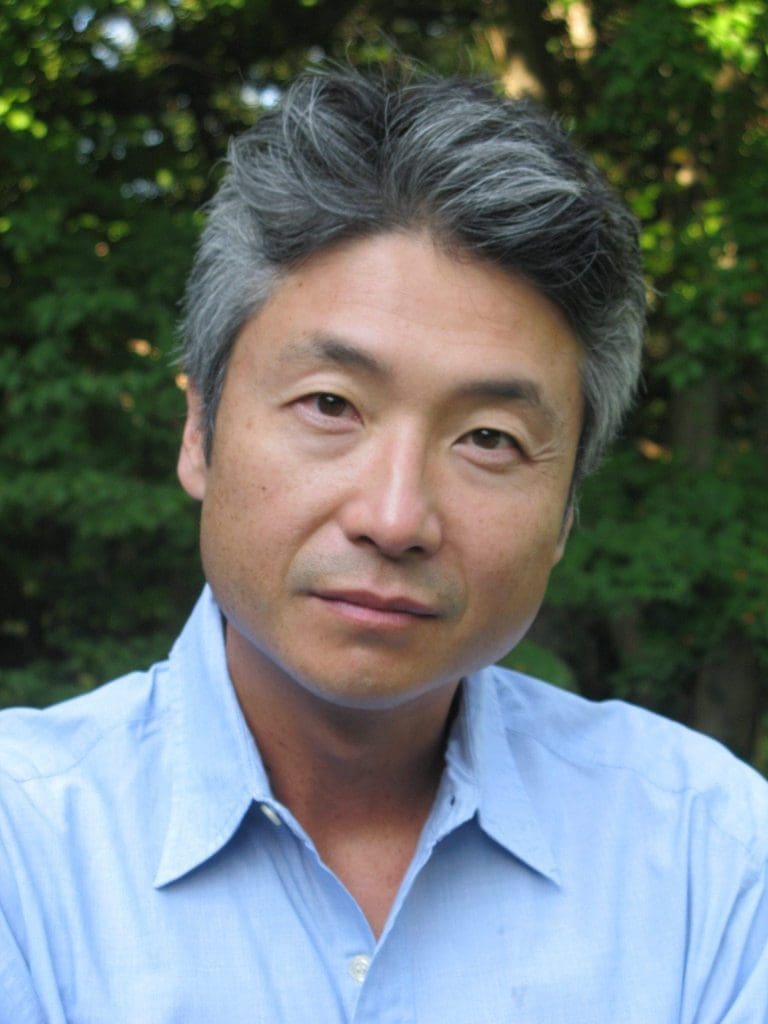 Chang-rae Lee is an award winning novelist and the author of On Such a Full Sea, his fifth novel. Set in what could be described as a dystopian American future, the novel centers around the story of Fan, a teenage girl who leaves the comfort and security of her Chinese labor settlement, B-Mor (formerly Baltimore), after the mysterious disappearance of her boyfriend. Narrated by the citizenry of B-Mor, we follow Fan’s journey through a volatile and sundered American landscape.
Chang-rae Lee is an award winning novelist and the author of On Such a Full Sea, his fifth novel. Set in what could be described as a dystopian American future, the novel centers around the story of Fan, a teenage girl who leaves the comfort and security of her Chinese labor settlement, B-Mor (formerly Baltimore), after the mysterious disappearance of her boyfriend. Narrated by the citizenry of B-Mor, we follow Fan’s journey through a volatile and sundered American landscape.
Lee will be at Word Bookstore in Jersey City on Wednesday, January 21 at 7:30 p.m. for the paperback release of On Such a Full Sea to read excerpts from the novel. Following the reading, there will be a signing.
I recently had the pleasure of speaking to Lee. Below is our conversation about On Such a Full Sea, the relationship between immigrant and dystopian fiction, and how his trip to a Chinese factory town influenced his novel’s narrative point of view.
You stated in a previous interview that every immigrant novel is a dystopian novel. Can you elaborate on that?
CL: Well, the classic immigrant story is about this newcomer, in a way an explorer in a new world, and everything that an immigrant experiences is unsettling, sometimes the opposite of what they might expect — often daunting, sometimes dangerous, unfortunately. So they are in a completely unsettled space, one that does not recognize them in the ways they want to be recognized, and if you think about it, that world, even though it’s the normal world and not a Mad Max space, it’s still something that is highly fraught for that newcomer. And when I was a kid enjoying stories, I never really had to look to dystopian stories to get what I needed. I would just read about these strange cultures like Cheever’s Westchester or Hemingway, and it would be this crazy world for me. So I think with immigrant novels, it’s also who is it dystopian for? I guess in that sense, and more generally, I’ve been interested in a very powerful context that is unsettling to the people that inhabit them.
So this is an association you made prior to writing On Such a Full Sea?
CL: Yeah, I mean I didn’t really conceive of this as a dystopian novel. I conceived it as a novel set in the future, and when you do that, you sort of have to make a few little nods to what that future is like. And I think if you read the novel, it’s really more about the community of B-Mor. It’s really an immigrant novel in there, but of course the wider context is a little skewed, it’s a little accentuated, or extrapolated a bit in terms of what we know. So that’s how I was thinking about it originally, changing the conditions and the context around these people, then seeing how they would both act and react.
You originally planned to write a novel set in a contemporary Chinese factory town, even taking the time to travel to China and visit one. How did your research for this original idea influence what you ultimately wrote?
CL: It definitely did. I didn’t use the nuts and bolts of the factory research that I did, because of course, I didn’t go to a fish production facility in China or a vegetable growing facility [the main industries of B-Mor], but I did see a facility which was like a campus, where people not only worked there but lived there. So that part comes over into the novel On Such a Full Sea, but really the most important thing about that is not the architecture or the infrastructure of the place but the ethos of the place. How these people think of themselves, what they hold to be valuable. So much of this book is about the orderly, quiet, regulated life that these people lead, and one of the reasons they are so interested in Fan’s story and telling Fan’s story is because they are in this cloister — safe but very tame, secure but a little dead. And I think they are just now starting to figure out how to break out of that and I think that’s the kind of sensibility I got from the workers at the factory, that they kind of put themselves in a situation where they had ceded some liberties and some possibilities for themselves. I think that’s the thing I was most interested in.
The novel is rather grounded, giving one the impression that it is not implausible. Can you tell me a bit about how you came up with this world? For example its structure, dividing it into communities such as B-Mor, open counties and charters? And what kind of current realities did you draw from?
CL: Absolutely, they reflect my notions of anxieties about our present society and culture. Definitely one of the things that I’ve been thinking about a lot was the separation of the classes, the shrinking of the middle class in our society, and that directly led, I’m sure, to my idea that these Charter villages would be these rarified communities and really there was no middle class in On Such a Full Sea. Basically, there are people who have everything and their service workers, wage slaves sort of, like the B-Mor people, and then everybody else who were really left to themselves without any kind of governmental oversight. And that’s sort of how I feel things are going already. Now we have Obamacare, but there is a lot of anxiety about health care in the novel, and that’s why that doctor is out in the counties, even though he’s just a veterinarian, it’s really whatever you can scratch out for yourself if you’re not born into a charter or born into a place like B-Mor. The structuring of the society definitely reflects my worries about certain trends and what’s happening with them.
The story is told in first person plural. How did you come to decide on having the residents of B-Mor tell Fan’s story?
CL: I was really focused upon and interested in the sensibility and consciousness of that community, starting in the factory in China with research, but when I brought it into the novel it was still very much the core. And I wondered a little bit at the start, how I should tell this story. Obviously, I could have told it very easily from Fan’s point of view. It could have just been “I do this, I do that, da da da,” but again, that wouldn’t have been the novel that I wanted to write. Obviously we’re focused on Fan, but really the novel is about how the community sees her and imagines her and desires things for her, is afraid for her. The emotional center of the book is not in Fan, but in the We. That’s how I decided to do the We. I felt that the book needed to be about the collected consciousness of this place, which is not monolithic—it changes over time, and sometimes maybe even creates. I enjoyed writing it.
Writer/Blogger at The Digest. Lifelong New Jersey resident. Actually likes this place.
- Sebastian Krawiechttps://thedigestonline.com/author/sebastian/
- Sebastian Krawiechttps://thedigestonline.com/author/sebastian/
- Sebastian Krawiechttps://thedigestonline.com/author/sebastian/
- Sebastian Krawiechttps://thedigestonline.com/author/sebastian/


